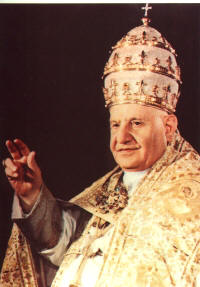 Angelo Roncalli was born November 25, 1881, at Sotto il Monte near Bergamo in
Northern Italy. His parents were small farmers, and in a large family Angelo
learned the give and take which later made him so excellent a diplomat. After
work in the fields, Angelo studied for the priesthood at the seminary in Bergamo.
He won a scholarship to the Pontifical Seminary at Rome. Ordained in 1904, he
said his first Mass in St. Peter's.
Angelo Roncalli was born November 25, 1881, at Sotto il Monte near Bergamo in
Northern Italy. His parents were small farmers, and in a large family Angelo
learned the give and take which later made him so excellent a diplomat. After
work in the fields, Angelo studied for the priesthood at the seminary in Bergamo.
He won a scholarship to the Pontifical Seminary at Rome. Ordained in 1904, he
said his first Mass in St. Peter's.
Young Father Roncalli returned to his diocese as secretary to Bishop
Radini-Tedeschi and Professor of Church History and Apologetics at the Bergamo
seminary. Somehow he found time to work for a diocesan organization of Catholic
women and for a residence hall for students. World War I interrupted this busy
life. Father Roncalli became Sergeant Roncalli of the medical corps and later
Lieutenant Roncalli of the chaplains' corps.
When the guns fell silent, Roncalli returned to his old life, but not for
long. Benedict XV called him to Rome to work for the important Congregation for
the Propagation of the Faith. In 1925 Pius XI made him an archbishop and
appointed him Apostolic Visitor to Bulgaria. Ten years later as Apostolic
Delegate to Greece and Turkey, Roncalli moved on to Istanbul. There he spent
most of World War II, and in that neutral city, so rife with suspicion and
intrigue, Roncalli managed to get along with everybody. He did what he could to
help the Greeks suffering from famine and occupation and to assure the Turks of
his affection. These years in the Near East afforded him many contacts with
members of the separated Eastern Churches, contacts which fanned the flame of
his desire to heal the sad breach between so many Eastern Catholics and the See
of Peter.
His success in Istanbul led Pius XII to send Roncalli as nuncio to France, a
France seething with passions aroused by the disasters and heroisms of the war.
Taking up his post in Paris early in 1945, Roncalli by delicate tact and warm
sympathy managed to minimize difficulties between outraged Gaullists and nervous
Vichyites, a task to appall the suavest of diplomats. He also displayed his
grasp of the need for international understanding by his friendly attitude as
unofficial observer at UNESCO. His ability to make friends and win respect for
the Church was shown in a striking way in 1953 when Pius XII made him a
cardinal. He received the red hat from his good friend President Auriol, a
socialist.
Shortly after, Cardinal Roncalli was made Patriarch of Venice. He proved
himself to be a people's patriarch, always accessible. Vigorous yet kindly, he
led his flock in the path of Christian virtue.
Such was the man the cardinals elected Pope on October 28, 1958. John XXIII,
as he chose to be called, soon showed himself to be an energetic man with
far-reaching plans. On January 25, 1959, he announced plans for a general or
ecumenical council which would be called the Second Vatican Council. He opened
it on October ll, 1962. By then he knew of his own fatal illness. His death on
June 3, 1963, followed a long agony. It evoked an astonishing wave of sympathy
from all quarters which was a response to his exceptionally warm and outgoing
personality.
Excerpted from "Popes
Through the Ages" by Joseph Brusher, S.J.

